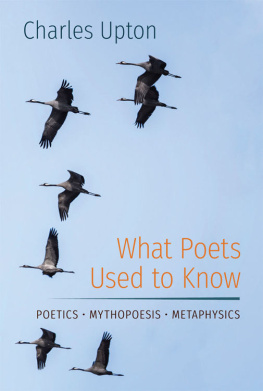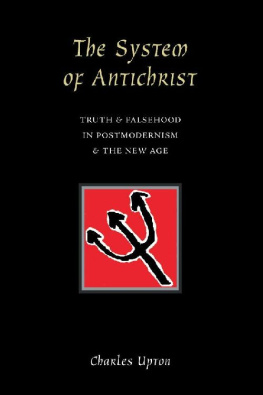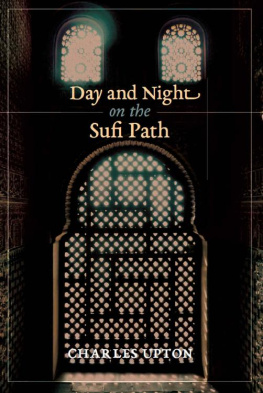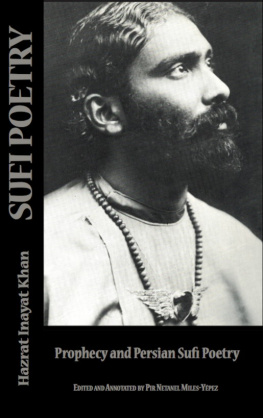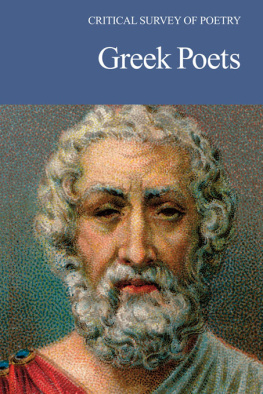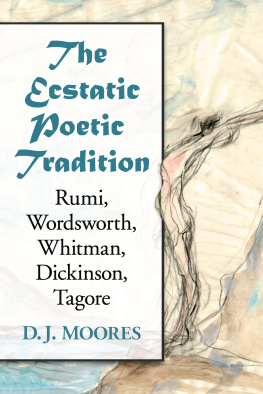Charles Upton - What Poets Used to Know: Poetics Mythopoesis Metaphysics
Here you can read online Charles Upton - What Poets Used to Know: Poetics Mythopoesis Metaphysics full text of the book (entire story) in english for free. Download pdf and epub, get meaning, cover and reviews about this ebook. year: 2016, publisher: Angelico Press, genre: Religion. Description of the work, (preface) as well as reviews are available. Best literature library LitArk.com created for fans of good reading and offers a wide selection of genres:
Romance novel
Science fiction
Adventure
Detective
Science
History
Home and family
Prose
Art
Politics
Computer
Non-fiction
Religion
Business
Children
Humor
Choose a favorite category and find really read worthwhile books. Enjoy immersion in the world of imagination, feel the emotions of the characters or learn something new for yourself, make an fascinating discovery.
- Book:What Poets Used to Know: Poetics Mythopoesis Metaphysics
- Author:
- Publisher:Angelico Press
- Genre:
- Year:2016
- Rating:5 / 5
- Favourites:Add to favourites
- Your mark:
- 100
- 1
- 2
- 3
- 4
- 5
What Poets Used to Know: Poetics Mythopoesis Metaphysics: summary, description and annotation
We offer to read an annotation, description, summary or preface (depends on what the author of the book "What Poets Used to Know: Poetics Mythopoesis Metaphysics" wrote himself). If you haven't found the necessary information about the book — write in the comments, we will try to find it.
What Poets Used to Know: Poetics Mythopoesis Metaphysics — read online for free the complete book (whole text) full work
Below is the text of the book, divided by pages. System saving the place of the last page read, allows you to conveniently read the book "What Poets Used to Know: Poetics Mythopoesis Metaphysics" online for free, without having to search again every time where you left off. Put a bookmark, and you can go to the page where you finished reading at any time.
Font size:
Interval:
Bookmark:
What Poets Used to Know
Poetics Mythopoesis Metaphysics
What Poets
Used to Know
Poetics Mythopoesis Metaphysics
Charles Upton

First published in the USA
by Angelico Press / Sophia Perennis
Charles Upton 2016
All rights reserved
Series editor: James R. Wetmore
No part of this book may be reproduced or transmitted,
in any form or by any means, without permission
For information, address:
Angelico Press
4709 Briar Knoll Dr.
Kettering, OH 45429
angelicopress.com
ISBN 978-1-59731-171-7 paperback
ISBN 978-1-59731-172-4 cloth
ISBN 978-1-59731-173-1 ebook
Four Anglo-Saxon riddles
Translated by Michael Alexander,
Reprinted by permission of Penguin Books, Ltd.
The poetry of Lew Welch
Reprinted by permission of City Lights Books
Cover Design: Michael Schrauzer
For Lewis Barrett Welch (1926 1971)
CONTENTS
Preface
POETRY, in our time, is not only a misunderstood art, but one that has been subject to a systematic program of denaturing and falsification, at the hands of those Andrew Harvey has characterized as official tastemakers who have outlawed the sublime, and... a contemporary poetry world addicted to cheap irony, unearned despair, bizarre pastiche, narcissistic confessionalism, and blindingly boring baroque word games [from Harveys introduction to Diamond Cutters: Contemporary Visionary Poets in America, Britain and Oceania, Tayen Lane, 2016 ].
Poetry, as defined in this volume, is not entertainment. It is not self-expression. It is not propaganda. It is not a way for any particular group to define its identity or push its agenda. It is not an exploration of the colors and textures and odors of language in and of itself, apart from questions of meaning. It is not a celebration of terror and trivia in roughly equal amounts. It is not a costume. It is not a role. It is not a juggling act. It is not the triumph of verbal nihilism, nor a magicians technique for the misdirection of attention, nor any other form of assault uponor betrayal ofhuman, natural or spiritual truth.
Poetry is a way of knowing based on the cultivation of symbolic or anagogic consciousness, expressed through the medium of human language. The games it plays are not sporting events but serious hunting expeditions carried out in the face of collective hunger and impending mass starvation. As such, it is a key to the vast treasure-house of lore and knowledge amassed by the human race over many millennia, a knowledge that remains locked in the vaults of verbal and mythopoetic symbolism. It is also one of the royal keys to the language of dreams, which make up perhaps a full third of human life. Without the ability to form and read symbols, to which the art of poetry provides access, it is virtually impossible to grasp the workings of ones own mind, and thus to come to any sort of realistic or practical understanding of what a human being is. And in view of the fact that we actually are human beings, what more disastrous form of ignorance can possibly be imagined? This is why poets have traditionally been the mystagogues, the psychopomps, the keepers of the Lore Hoard, the unacknowledged legislators of the human race.
On the other hand, words are weak; someone who goes to meet a situation requiring any degree of subtlety or courage armed only with words is courting serious defeat. Why? Because it is possible to divorce words from truth on the one hand and from action on the other, and because all the Principalities and Powers of the Darkness of This World are dedicated to suggesting and enforcing this double divorce. Words can only overcome the ever-present danger of fatal weakness when three different criteria are met:
(1) When they are backed up by the full weight of meaning, by which I mean objective truth;
(2) When this truth has been paid for in full, thereby giving the speaker the authority and the right to speak it, seeing that it is impossible to be as good as your word if your word is better than you are;
(3) When the words are spoken in an intrinsically appropriate context, one in which their meaning and authority are not squandered on relatively worthless goods, or simply thrown away, but rather used to purchase something of real value: the full attention of the interested listener to something actually worth listening to. Such contexts are hard to come by these days; it is the rare poetry reading that can provide the same contextual integrity that the rituals of poetic theurgy and courtly praise of the heroes did in former ages. In our time, the true occasion for the poem will often appear at unexpected moments, and sometimes must be caught on the fly.
In this book I do my best to open the vaults of anagogic knowledge, lay out the laws of mythopoetic symbolism proper to the art of poetry, and point the reader toward the sources of traditional content proper to these intrinsically human ways of knowinga truly vast territoryas well as defining the skills and techniques that poets have employed throughout the centuries to hunt and catch this knowledge and drive it deep into the human soul, on several levels simultaneously, thereby allowing us to know certain things in essence, as if by taste, before we even know that we know them. The truths we learn by the anagogic method are not mere aesthetic or psychological window-dressing; they are essential to the integrity of human life on earth.
Language is the central function of the human being; its anagogic role is to lead our consciousness beyond the limits of the sense-world by the process of naming. To witness the objects of both the world and the psyche in terms not of the generic categories they occupy but of their intrinsic identities is to transfigure them. It is to view them in the mirror of what the Buddhists call shunyata or voidnessthat which reveals their transcendence of literal definitionsand of tathata or suchnessthat which unveils their uniqueness and incomparability. The language of animals is utilitarian rather than symbolic; it has to do with whether or not a given object is physically present, and if so how it might be avoided or exploited; it deals in signs relating to what is going on now in the immediate environment rather than symbols of the Always So. But human language is fully symbolic, and consequently possesses the power to invoke the essential qualities of things, whether or not they are present in space and time, or can be used to satisfy immediate or future needs, or are designed to occupy physical space at all. But insofar as symbols fulfill this anagogic function, they become signs again, though in a different sense: instead of indicating what is present in the physical world, they make present, to human consciousness, realities of the spiritual world.
Every truth is both a recognition and an act; consequently there is no truth without a seer-and-speakera principle that applies even to the Creator of the universe. A book also has one or more seeing speakers behind it, and thus represents a record of human perception confirmed and established by acts of human conception. But once machines are given power over languageonce words begin to appear that are spoken by no-one, not even in the silence of the human mindthen language inverts. It becomes not an outward sign of an inward meaningin other words, a sacramentbut rather a draft levied against meaning, a phenomenon of debt rather than value, a raid on the treasury of human thought. For us to turn our language over to artificial intelligence programs, allowing it to be manipulated by algorithms rather than invoked by human acts of perception and conception, and fully paid for by the sacrifice that each such act requires, is therefore an unmitigated disaster; it represents nothing less than the betrayal of the human form. This is why it is of vital importance for us to regain at least some idea of what poets used to know, and thereby understand the sacred trust laid upon us by the power of human speech. The following essays are part of my contribution to this effort.
Next pageFont size:
Interval:
Bookmark:
Similar books «What Poets Used to Know: Poetics Mythopoesis Metaphysics»
Look at similar books to What Poets Used to Know: Poetics Mythopoesis Metaphysics. We have selected literature similar in name and meaning in the hope of providing readers with more options to find new, interesting, not yet read works.
Discussion, reviews of the book What Poets Used to Know: Poetics Mythopoesis Metaphysics and just readers' own opinions. Leave your comments, write what you think about the work, its meaning or the main characters. Specify what exactly you liked and what you didn't like, and why you think so.

